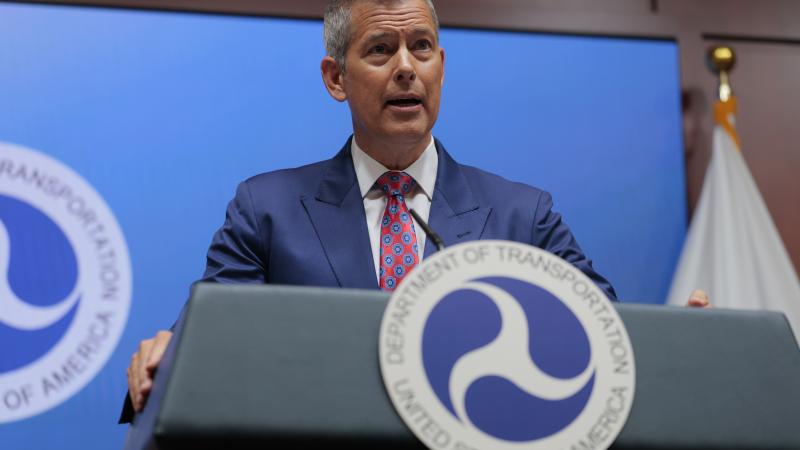Vaccine mandate could drive truckers off the road, worsen supply chain crisis, industry warns
OSHA rule could force "up to 13% of drivers to leave the industry entirely," said industry spokesman, amid indications officials are heeding truckers' concerns.
Fearful that the Biden administration's private sector vaccine mandate could force commercial truckers off the road and exacerbate disruptions to an already backlogged supply chain, the U.S. trucking industry is demanding an exemption for drivers, amid signs their concerns are being heeded by officials.
"The U.S. is already facing unprecedented supply chain disruptions and delays due to many factors, including significant labor shortages, production shutdowns, a shortage of raw materials, and pent-up consumer demand," American Trucking Associations President and CEO Chris Spear said, and ATA data "shows that a vaccine mandate may very well further cripple the supply chain throughout the country by forcing up to 13% of drivers to leave the industry entirely,"
The Biden mandate requires private employers with 100 employees or more to require COVID vaccination or, failing that, weekly testing as a condition of employment. It imposes fines on those that don't comply under the oversight of the Occupational Safety and Health Administration (OSHA) within the U.S. Department Labor.
A federal appeals court on Saturday temporarily halted the mandate, citing "grave constitutional and statutory issues" raised by the plaintiffs, which include Texas and four other states. If ultimately upheld by the courts, the mandate is expected to impact roughly 80 million Americans.
However, the proposed rule change exempts employees "who exclusively work outdoors or remotely and have minimal contact with others indoors, and all indications thus far from the Department of Labor suggest this exemption does apply to the commercial truck driver population," said Spear, sounding an optimistic note in a statement Friday.
"If you're a truck driver and you're outside, you're in a cab driving by yourself, this doesn't impact you," Labor Secretary Marty Walsh said of the rule change. "If you're a worker outside working in the area, this doesn't impact you."
An attorney who specializes in transportation law argues that federal and state regulatory jurisdiction comes into play, since transportation is regulated by the U.S. Department of Transportation, not the U.S. Department of Labor.
"Generally, while traveling on public highways, DOT has jurisdiction," Angelo Filippi, an attorney with Kelley Kronenberg law firm, told Overdrive. "However, while loading and unloading trucks, OSHA regulations govern the safety and health of the workers and the responsibilities of employers to ensure their safety at the warehouse, at the dock, at the rig, at the construction site, at the airport terminal and in all places truckers go to deliver and pick up loads."
The rule exemption for employees who work outside "will exempt truckers while in transport anyway," Filippi said. "When loading or unloading, they are not at their employer's workplace either, so the mandates will not apply. They will have to comply only with rules established by the customer/vendor. In short ... for the vast majority of truckers, the mandate’s effect will be negligible. Remember also that OSHA rules do not apply to independent contractors."
Spear had sent a letter to the Biden administration warning that a vaccine mandate would wreak havoc on the commercial trucking industry and nearly halt transportation of goods. Amid an already dire commercial truck driver shortage, a significant number of truck drivers have said they won't comply with the mandate.
"Our professional truck drivers could end up leaving this industry and affect the delivery mode that this country enjoys so heavily," warned Dave Heller, vice president of government affairs for the Truckload Carriers Association.
Representatives from the trucking industry also met with members of the White House Office of Management and Budget to express concerns about the mandate. If the OSHA rule were to apply to the trucking industry," Spear argued, it could lose 37% of its "drivers to retirements, attrition to smaller carriers and/or conversion to independent contractor owner-operators."
The mandate has been viewed as an affront by many truckers, who were working 24/7 during the year-long lockdowns when the majority of Americans were forced to stay home. Truckers were frontline workers, delivering PPE, medical supplies, food, fuel, medicine, vaccines, and other goods and products that consumers were increasingly purchasing online. They persevered in their critical role without any mandates, often under stressful conditions — spending the majority of their workday alone in the cab of their trucks.
"While much of the country was sequestered in their homes, the trucking industry served its essential function and did so successfully with safety standards developed by public health experts," Spear said.
Mandates and employee pattern shifts would put a wrench in the already strapped industry that saw a driver shortage during the lockdowns last year, after more older drivers retired and driver training schools were closed. The Department of Transportation estimates nearly 30% of truckers will be 65 or older in 10 years, further reducing the force as they retire.
Those who retire or quit won't be easy to replace because of the training and time it takes to get a commercial driver's license. Attracting younger or new drivers may prove difficult for those not accustomed to long hours on the road away from home. (One provision in the recently passed infrastructure bill addresses this issue through a pilot program attracting new drivers under age 21, which the ATA supports.)
The commercial trucking industry is the lifeblood of American commerce. Truckers move 10.23 billion tons of freight annually, or 72.5% of total domestic tonnage shipped in the United States. Without truckers, commerce would come to a halt.
















